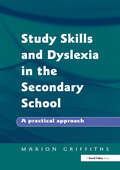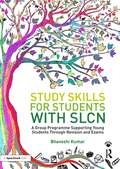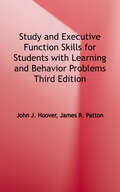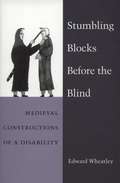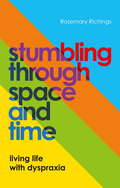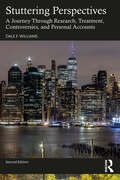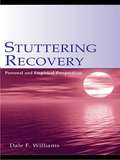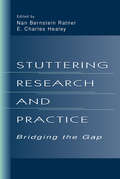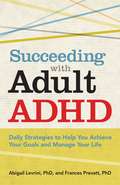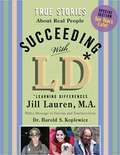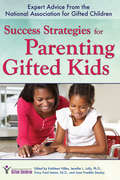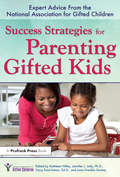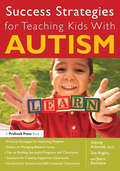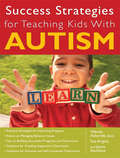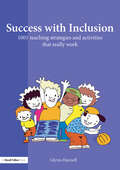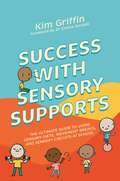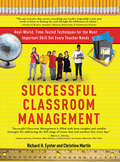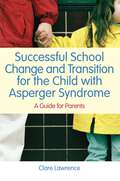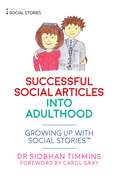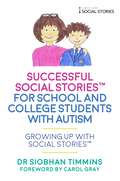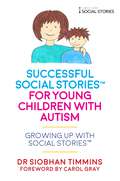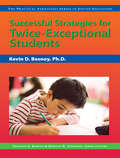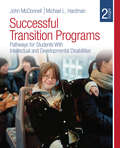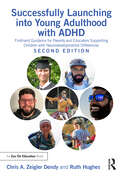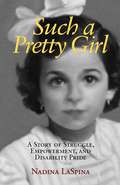- Table View
- List View
Study Skills and Dyslexia in the Secondary School: A Practical Approach
by Marion GriffithsThis book is aimed at those who encounter secondary school students with dyslexia on a daily basis. It takes a practical approach by breaking down the whole process of assessing the issues involved and then suggesting ways for teaching staff and students to implement a suitable program of study skills. It is well structured, clear, useful and written with the needs of busy teachers and students very much in mind. Included are assessment approaches, checklists, photocopiable activities, and suggestions for useful resources. Results from qualitative research are included to provide an additional practical insight into study skills and dyslexia in the secondary school. Theoretical knowledge has been used to underpin and inform practice. Teachers of students with dyslexia who are not specialists should find this a useful guide. It will also be of great use to SENCOs and Teaching Assistants.
Study Skills for Students with SLCN: A Group Programme Supporting Young Students Through Revision and Exams
by Bhaveshi KumarThis highly practical resource has been designed to support professionals working with students who have SLCN (Speech, Language and Communication Needs) following a mainstream educational curriculum. Structured as a flexible 10-session programme, it takes a holistic approach to learning, encouraging students to take an active role in their studies by identifying individual learning strengths and building a "toolbox" of successful strategies for revision. With photocopiable pages and downloadable resources, the advice and skills explored in this programme can be adapted to suit students with a range of abilities and incorporated into a timetable that can be used flexibly, over as many weeks as necessary, with very little planning required. Sessions focus on: Learning about revision and study methods, using a combination of visual, auditory and kinaesthetic techniques Creating a study skills folder and revision timetable Teaching command words (words used in exam questions) and exam preparation Building healthy study habits and managing anxiety Being proud of achievements and developing self esteem Setting goals and becoming independent Created to support a range of students, including those with a known diagnosis of autism, developmental language disorder, dyslexia, dyspraxia and attention deficit hyperactivity disorder, this is an invaluable resource for all professionals looking to support young adults in the build up to exams.
Study and Executive Function Skills for Students with Learning and Behavior Problems: A Practitioner's Guide
by James R. Patton John J. Hoover"This book focuses on study skills and executive function skills for students in grades K-12 who are struggling learners, including those with executive function disorder, dyslexia, and ADHD, to help them with their learning and behavior problems". --Provided by publisher.
Stumbling Blocks Before The Blind: Medieval Constructions Of A Disability
by Edward Wheatley<P>Stumbling Blocks Before the Blind presents the first comprehensive exploration of a disability in the Middle Ages, drawing on the literature, history, art history, and religious discourse of England and France. It relates current theories of disability to the cultural and institutional constructions of blindness in the eleventh through fifteenth centuries, examining the surprising differences in the treatment of blind people and the responses to blindness in these two countries. <P>The book shows that pernicious attitudes about blindness were partially offset by innovations and ameliorations---social; literary; and, to an extent, medical---that began to foster a fuller understanding and acceptance of blindness. A number of practices and institutions in France, both positive and negative---blinding as punishment, the foundation of hospices for the blind, and some medical treatment---resulted in not only attitudes that commodified human sight but also inhumane satire against the blind in French literature, both secular and religious. Anglo-Saxon and later medieval England differed markedly in all three of these areas, and the less prominent position of blind people in society resulted in noticeably fewer cruel representations in literature. This book will interest students of literature, history, art history, and religion because it will provide clear contexts for considering any medieval artifact relating to blindness---a literary text, a historical document, a theological treatise, or a work of art. <P>For some readers, the book will serve as an introduction to the field of disability studies, an area of increasing interest both within and outside of the academy. Edward Wheatley is Surtz Professor of Medieval Literature at Loyola University, Chicago.
Stumbling through Space and Time: Living Life with Dyspraxia
by Rosemary Richings"In 1994, I was diagnosed with dyspraxia, and I was unable to do everything that children are expected to do by the time they're in school. For me, this included everything from riding a bike and catching a ball, to reading, writing, and basic math."When talking about her dyspraxia, Rosemary Richings is often met with confusion. Why do so few people understand dyspraxia, or even know what it is?Rosemary shares her experience of growing up dyspraxic, and how it impacts her sense of space, time and co-ordination. Diagnosed with DCD at the age of four, Rosemary shares her insights and experience dealing with challenges, from coping with bullies in school to choosing a dyspraxia-friendly university, pursuing self-employment and travelling abroad.Rosemary shares guidance for others about what helped her develop her skills, including ballet and gymnastics, the Wilbarger Protocol (brushing therapy) and equestrian therapy. Full of practical tips and insights into the strategies that gave Rosemary the confidence to succeed, this is an essential guide for other dyspraxics and those supporting them, which shows you how you too can thrive as a dyspraxic person.
Stuttering Perspectives: A Journey Through Research, Treatment, Controversies, and Personal Accounts
by Dale F. WilliamsStuttering Perspectives is a highly engaging book that interweaves discussion and research about stuttering with personal accounts. Written in a reader-friendly and informal style, the book considers stuttering from a variety of angles, providing the reader with a nuanced and holistic view. In this way, topics such as therapy, support groups, listener reactions, and many others are not only explained within the context of current research, but also illustrated with lively examples demonstrating the stuttering experience. Fully updated in its second edition, the book includes new stories, additional discussion questions, and inclusion of contemporary stuttering issues not contained in the original version. This book is highly relevant reading for speech and language professionals, as well as students of communication sciences and disorders. It will also be of great interest to people who stutter and anyone with an interest in fluency disorders.
Stuttering Recovery: Personal and Empirical Perspectives
by Dale F. WilliamsStuttering Recovery: Personal and Empirical Perspectives is a highly original and engaging book serving to not only educate readers on topics related to stuttering, but also to stimulate discussion. The author interweaves personal accounts of people who stutter with informational chapters highlighting up-to-date research on recovery-related issues such as therapy, support groups, listener reactions, risk-taking, and dealing with family members and significant others.Reader-friendly and understandable, this book incorporates various perspectives to teach and illustrate the different aspects of recovery. Chapters are paired with stories presenting all sides of the recovery process -- the humorous and serious, the uplifting and frustrating, the thoughtful and emotional, and everything in-between. The result is a text that is entertaining and instructive.Stuttering Recovery: Personal and Empirical Perspectives is intended for undergraduate and graduate students, clinicians, speech-language professionals, people who stutter, significant others, and anyone else who has an interest in fluency disorders.
Stuttering Research and Practice: Bridging the Gap
by Nan Bernstein Ratner and E. Charles HealeyCurrent approaches to treating stuttering do not reflect the new understanding of its nature which has emerged from recent studies. This book brings together speech scientists and clinicians to discuss the best ways to close the perceived gap and maximize the effectiveness of treatment. Together, the chapters offer a comprehensive state-of-the-art overview of the complexities of stuttering and its remediation. Genetic, neuropsychological, behavioral, and often-neglected affective and cognitive factors are all considered. Preferred methodologies for empirical investigation are described, and specific examples of applied clinical research designs are provided. The book will be crucial reading for all those professionally concerned with fluency disorders and their students.
Succeeding With Adult ADHD: Daily Strategies to Help You Achieve Your Goals and Manage Your Life
by Abigail Levrini Frances PrevattIf you've been diagnosed with adult ADHD, you are well-acquainted with the procrastination, lack of motivation, and muddled time management that can thwart your best efforts to achieve. You may find yourself constantly distracted, or fear you're about to forget something important. Or you may firmly set a goal for yourself, only to abandon it later in frustration.<p><p> This book will help you overcome the challenges of adult ADHD and find fulfillment in taking the practical steps needed to achieve your goals.<p> In easy-to-master lessons, ADHD specialists Abigail Levrini and Frances Prevatt offer realistic, proven, and unique daily strategies to help you succeed with adult ADHD. Each chapter contains checklists, worksheets, and Start Reading/Stop Reading reminders to help you break down large jobs, such as organizing your space, studying effectively, or listening to your partner, into manageable tasks. You'll learn how to identify the right treatments and support for your lifestyle and find strategies for handling emotional roadblocks such as stress, anxiety, depression, and fear of failure. <p> This dynamic and interactive text will become an indispensable aid in helping you translate your goals into realities to succeed with adult ADHD.
Succeeding With LD: True Stories About Real People With Ld
by Jill LaurenJill Lauren profiles amazing individuals who live with a learning disability and have effectively conquered their challenges to achieve success. These moving biographical sketches highlight the stories of a remarkable group of youth and adults who lead fulfilling lives because of their hard work, courage, and resilience. These inspiring people describe the resources they used to focus on their strengths and to persevere. Their poignant, real-life stories generate empathy and understanding in the community and stress the importance of a strong support network. First published in 1997, this new edition includes a 10-years later; update on each individual profiled.
Success Strategies for Parenting Gifted Kids: Expert Advice From the National Association for Gifted Children
by Tracy Inman Jennifer Jolly Kathleen Nilles Joan Franklin SmutnyWhen parents need guidance on raising gifted kids, they can turn to Success Strategies for Parenting Gifted Kids: Expert Advice From the National Association for Gifted Children. This collection of practical, dynamic articles from NAGC's Parenting for High Potential magazine:Offers parents the support and resources they need to help their children find success in school and beyond.Presents easy-to-understand research-based concepts and practical how-to strategies.Is written by leading experts in the field of gifted education.Provides advice for navigating complex issues that gifted students may face.Gives parents an easy-to-understand overview of each topic based on research and best practices.Chapters address such topics as underachievement, twice-exceptionality, acceleration, underrepresented populations, student advocacy, and more. Additionally, the book includes discussion and reflection questions that are perfect for parent support groups, conversations with families and children, and individual parent reflections.
Success Strategies for Parenting Gifted Kids: Expert Advice From the National Association for Gifted Children
by Jennifer L. Jolly Tracy Ford Inman Joan Franklin Smutny Kathleen NillesWhen parents need guidance on raising gifted kids, they can turn to Success Strategies for Parenting Gifted Kids: Expert Advice From the National Association for Gifted Children. This collection of practical, dynamic articles from NAGC's Parenting for High Potential magazine:
Success Strategies for Teaching Kids With Autism
by Wendy Ashcroft Sue Argiro Joyce KeohaneAlthough an abundance of research exists on working with students with autism, teachers need the practical strategies in Success Strategies for Teaching Kids With Autism to build successful programs and services for kids with autism.The authors, seasoned classroom teachers and consultants for a large public school autism support program, look at ways teachers can apply best practices for teaching special needs students. They offer field-tested ideas for teachers to implement, covering topics such as managing difficult behaviors, teaching social skills, addressing communication difficulties, creating schedules, and organizing the classroom.The book includes a detailed section on using applied behavior analysis, providing practical examples for teachers to employ in their own classrooms in order to modify student behaviors and increase learning. Including teacher-friendly overviews of the educational needs of students with autism and ideal teaching methods, the book also provides reproducible materials and photographs that show the strategies in action.
Success Strategies for Teaching Kids With Autism
by Wendy AshcroftSuccess Strategies for Teaching Kids with Autism - Wendy Ashcroft, PhD, Sue Argiro, Joyce KeohaneThe perfect handbook for any teacher looking for proven solutions for helping children with autism succeedAlthough an abundance of research exists on working with students with autism, teachers need the practical strategies in Success Strategies for Teaching Kids With Autismto build successful programs and services for kids with autism. The authors, seasoned classroom teachers and consultants for a large public school autism support program, look at ways teachers can apply best practices for teaching special needs students on smaller budgets, tight schedules, and minimal materials. They offer more than 25 field-tested ideas for teachers to implement, covering topics such as managing difficult behaviors, teaching social skills, addressing language and communication difficulties, creating schedules, and organizing the classroom. Including teacher-friendly overviews of the educational needs of students with autism and ideal teaching methods, the book also provides reproducible materials that teachers can copy and use immediately in their classrooms, along with photographs and detailed graphics that show their strategies in action. Features proven advice and strategies from experienced special educatorsAddresses the three main areas of need for students with autism: language, social skills, and behavior managementOffers practical solutions to creating an autism-friendly classroomProvides a concise introduction to the educational needs of students with autismIncludes guidance for both inclusion and self-contained classroomsPrufrock Press offers award-winning products focused on gifted, advanced, and special needs learners. For more than 20 years, Prufrock has supported parents and teachers with a wide range of resources based on sound research. The average day of a parent or teacher of a gifted or special needs learner is filled with a thousand celebrations and challenges. Prufrock's goal is to provide practical solutions to those challenges-to provide readers with timesaving, research-based tools that allow them to spend less time on the challenges and more time on the celebrations. Prufrock Press' line of products features:Resources on parenting the special needs learnerSage advice on teaching in the inclusive classroomAdvanced learning tools for gifted children and inquisitive learnersCutting-edge information on innovative teaching approachesResources for college planning for gifted and special needs learnersPrufrock Press is committed to resources based on sound research. It has a senior advisory group composed of the top scholars in the field of education and psychology. All of the company's editors have graduate degrees in education or children's literature, and they all have classroom experience. In essence, when a reader holds a book by Prufrock Press, he or she knows that the information found in that book will be research-based and reflect agreed upon best practices in the field of education and child psychology.
Success with Inclusion: 1001 Teaching Strategies and Activities that Really Work
by Glynis HannellToday's classroom welcomes diversity, where many levels, speeds and styles of learning coexist. Success with Inclusion provides over 1000 specific strategies to help identified areas of difficulty or advanced development. Using this book, teachers will be able to: quickly and easily identify and record their pupils’ individual learning patterns using the observation charts provided structure a well planned inclusive environment implement creative and thoughtful learning interventions. create an atmosphere of flexibility and compassion. Author and experienced teacher Glynis Hannell gets down to the nitty gritty with chapters full of practical and creative ideas that will help accommodate not only pupils with difficulties but also those who are advanced. Learning strategies here will help you to: be an effective inclusive teacher address a variety of reading difficulties support pupils' writing skills make maths comprehensible, fun and relevant enhance pupils' concentration encourage habits of organisation foster teamwork between yourself, colleagues, parents and pupils. The 42 photocopiable worksheets, checklists, charts, games and planners are provided in the appendix to give teachers a headstart. Also here are observation charts, literacy and maths resources, as well as support materials for teachers, pupils and parents.
Success with Sensory Supports: The ultimate guide to using sensory diets, movement breaks, and sensory circuits at school
by Kim GriffinSensory needs are being recognised as a vital part of learning, development and engagement within the classroom and are being used more often to make education both accessible and fun. To harness the full potential of sensory supports, using these strategies correctly is key!This is the essential guide to using sensory strategies successfully with school children, from occupational therapist, Kim Griffin, who has 20 years of experience supporting sensory needs.As you make your way through the book, you will be joined by Isla and Noah, two children whose stories will help illustrate how information in the book can be used practically. In addition, the book includes personal anecdotes from Kim, links to further reading, reflective questions and teacher perspectives to show how a teacher might use the information in the classroom. These features will help you easily identify sensory needs and use sensory tools effectively.
Successful Classroom Management
by Richard H. Eyster Christine MartinEach year, tens of thousands of new teachers head out for their first teaching job, ready to fulfill a lifetime dream. However, most teachers have nothing to prepare them for or support them on one of the most important parts of their job: how to effectively run a classroom and handle the students. Successful Classroom Management is the first book to give you the skills you need to manage a classroom effectively. Richard H. Eyster and Christine Martin present the lessons that have made them the most sought-after seminar trainers on the topic, addressing: Handling Classroom Problems Troubleshooting Issues Enforcing Discipline Inspiring Students Creating an Engaging Classroom Atmosphere Filled with expert advice, stories and tips from teachers, and spot-on techniques, this is your new essential handbook that will help you not only survive in the classroom, but also live your dream and give your students the full gifts that come from a great education.
Successful School Change and Transition for the Child with Asperger Syndrome
by Clare LawrenceMoving to a new school can be a daunting prospect for the child with Asperger syndrome, and parents are often left feeling powerless to help prevent the anxiety and loss of confidence which may ensue. Clare Lawrence's new book provides parents of children with Asperger syndrome with practical advice on how to prepare their child for moving to a new school, and how to help make the transition as smooth as possible. A wide range of material is covered, including useful guidance on choosing the right school, supporting the child during the period prior to the move, and identifying and practising the different social rules and expectations of the new school. The strategies in the book can be adapted for children of all ages and include working out a transition time-line, identifying a named adult and 'safe haven' at the school, and effective communication between parents, teachers and support staff. This clear and accessible book will be an invaluable resource for parents of children with AS who are moving to a new school, and will also be of interest to the teachers and education professionals who work with them.
Successful Social Articles into Adulthood: Growing Up with Social Stories™
by Siobhan TimminsThe third volume in the Growing Up with Social Stories™ series is specifically devoted to developing a social understanding around some of the most common issues faced by autistic young adults. Topics include applying for a job, looking after physical and mental health, and staying safe in a new home.
Successful Social Stories™ for School and College Students with Autism: Growing Up with Social Stories™
by Carol Gray Siobhan TimminsAs children grow up and spend more and more time away from home in schools and colleges, life often seems to get increasingly complicated. Autism makes the challenges they meet in these new environments even more difficult to navigate. Social Stories™ is a highly regarded strategy that parents and teachers can use to help young people with autism understand the new social situations they face during this time. Writing an effective Story takes a special set of skills, and in this fully illustrated book Dr Siobhan Timmins explains how to acquire and hone these techniques and put them into practice. Following on from her book on writing Social Stories™ for young children, this book on the next age group up includes 160 illustrations and clear examples based on the author's own experiences of raising a son with autism. She explains how to identify the underlying issues, and articulate the key ideas so that young learners can find connections between Stories to build a greater understanding of relationships, the adult world and their own identity. The book is an invaluable guide to creating bridges between young people and the parts of life they find most difficult.
Successful Social Stories™ for Young Children: Growing Up with Social Stories™
by Carol Gray Siobhan TimminsSocial StoriesTM are acknowledged as a very successful way of teaching concepts and social understanding to children with autism spectrum disorders, but considerable skill is needed to write the most effective story. This clear and engaging book introduces ways of thinking about the issues your child finds difficult, and includes 32 stories created by Dr Siobhan Timmins for her son during his early years, with helpful explanations of how she did it, and what the underlying thinking was behind each set of stories. She explains how the stories build upon each other to help the child to understand further, more complex topics, and how to see the connections so that you can best help your child. From basic skills such as learning to listen, wait and share, to common fears, this book takes the mystery out of creating effective Social StoriesTM and amply demonstrates how to put together a cohesive set of stories which your child can understand and relate to.
Successful Strategies for Twice-Exceptional Students
by Kevin D. BesnoySome kids, including gifted students, have difficulties in school. Gifted students with learning disabilities may continuously struggle with certain areas of instruction, but never receive identification of or accommodation for their difficulties, because their gifts mask their disabilities. Gifted students with learning disabilities need unique instruction and a practical use of accommodations to succeed in school. It is important for educators to familiarize themselves with the definitions and characteristics of various learning disabilities, and learn the strategies they can use in the classroom to help gifted/learning-disabled students succeed. In this book, Kevin Besnoy takes an in-depth look at the various learning disabilities and difficulties some gifted students face, provides practical tips for accommodating and planning instruction for those students, and gives an overview of federal law related to this population. This is one of the books in Prufrock Press' popular Practical Strategies Series in Gifted Education. This series offers a unique collection of tightly focused books that provide a concise, practical introduction to important topics concerning the education of gifted children. The guides offer a perfect beginner's introduction to key information about gifted and talented education.
Successful Transition Programs: Pathways for Students With Intellectual and Developmental Disabilities (Second Edition)
by Michael L Hardman John McDonnellAddressing the full range of curricular and instructional issues that face professionals working in middle school, high school, and post-high school programs, Successful Transition Programs: Pathways for Students With Intellectual and Developmental Disabilities, Second Edition is the most relevant text available for teachers and administrators. Authors John McDonnell and Michael L. Hardman take the position that the most effective transition programs are those that cumulatively build on the capacity of students for employment, community living, and citizenship.
Successfully Launching into Young Adulthood with ADHD: Firsthand Guidance for Parents and Educators Supporting Children with Neurodevelopmental Differences
by Chris A. Zeigler Dendy Ruth HughesThis new edition of Successfully Launching into Young Adulthood with ADHD provides firsthand guidance for both parents and professionals to help teens prepare for a bright future after high school. The advice and strategies outlined in this book are evidence based and provide much-needed guidance to parents and the professionals who educate, coach and treat these students. This guidance will ensure that teens are ready to meet upcoming challenges and demands after high school graduation. With an always hopeful and personable message, the authors share their own and other parents’ insights on avoiding common missteps, the perils of a premature launch to college and finding what works for their unique child. Updated chapters include a discussion around medications and new information on gap year programs, and college accommodations. This top-notch guide is essential reading for any parent raising a young adult with ADHD and for the professionals who work with them.
Such a Pretty Girl: A Story of Struggle, Empowerment, and Disability Pride
by Nadina LaSpinaA memoir by a disability rights activist Such a Pretty Girl is Nadina LaSpina's story—from her early years in her native Sicily, where still a baby she contracts polio, a fact that makes her the object of well-meaning pity and the target of messages of hopelessness; to her adolescence and youth in America, spent almost entirely in hospitals, where she is tortured in the quest for a cure and made to feel that her body no longer belongs to her; to her rebellion and her activism in the disability rights movement.LaSpina’s personal growth parallels the movement’s political development—from coming together, organizing, and fighting against exclusion from public and social life, to the forging of a common identity, the blossoming of disability arts and culture, and the embracing of disability pride.While unique, the author's journey is also one with which many disabled people can identify. It is the journey to find one's place in an ableist world—a world not made for disabled people, where disability is only seen in negative terms. La Spina refutes all stereotypical narratives of disability. Through the telling of her life’s story, without editorializing, she shows the harm that the overwhelming focus on pity and on a cure that remains elusive has done to disabled people. Her story exposes the disability prejudice ingrained in our sociopolitical system and denounces the oppressive standards of normalcy in a society that devalues those who are different and denies them basic rights.Written as continuous narrative and in a subtle and intimate voice, Such a Pretty Girl is a memoir as captivating as a novel. It is one of the few disability memoirs to focus on activism, and one of the first by an immigrant.
